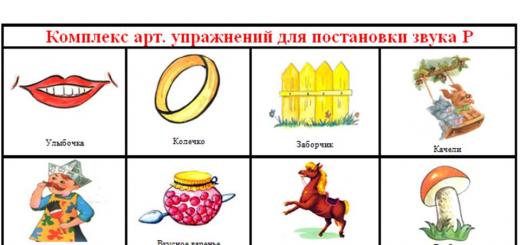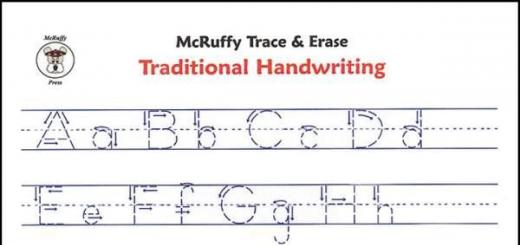It is expressed by the verb in personal form in any tense, voice and mood. The form of the verb can be simple, i.e. without auxiliary verbs (He speaks English. He speaks English), or complex, i.e. with auxiliary verbs (Not is reading now. He is reading now. I shall be waiting for you at 5. I'll be waiting for you at 5).
Note. In Russian, the forms I will wait, I will read, etc. are also a simple predicate expressed by a complex form of the verb in the future tense.
Verbs with postpositions (such as to carry out) stable combinations with a verbal meaning (such as to take care to care) also form a simple predicate in the sentence.
- The beta-rays are known to move with high velocity. -- Beta rays are known to travel at high speeds.
- I seem to have promised you that I "d take you in my lab. - It seems that I promised you that I would take you to my laboratory.
- He is sure to be sent there. “He will certainly be sent there.
- He was seen crossing the bridge. We saw him cross the bridge
Compound nominal predicate consists of a linking verb (link-verb) and a nominal part of the predicate (nominal part of the predicate1). The nominal part of the predicate is also called the “predicative member” (predicative). The copula has auxiliary functions in the predicate: it connects the subject with the nominal part of the predicate and serves as an indicator of time, voice, mood and, in some cases, person and number. The most common link is the verb to be:
- quantities of force. Forces are vector quantities.
Note. In Russian, the link is usually not used in the present tense.
In addition to the verb to be, other verbs can also perform the link function. Such verbs include: to get, to become, to grow, to turn in the meaning of becoming, moving from one state to another; to seem, to appear (Does not seem quite well. He seems to be quite healthy.) and some others, indicating being in a state or transition from one state to another of an object or person indicated by a noun (or pronoun) in the function of the subject:
- The weather got colder and the leaves on the trees turned yellow -- The weather got colder and the leaves on the trees turned yellow.
Note. When the same verbs are used in their main meaning, they perform the function of a simple predicate in a sentence, for example: Not turned the key in the lock. He turned the key in the lock. (Here turned-simple predicate, the key- direct object.) This collective farm grow
s vegetables. This farm grows vegetables. (Here grows is a simple predicate, vegetables is a direct object.)The nominal part of the predicate can be expressed:
1) Noun:
- The unit of resistance is an ohm -- The unit of resistance. is om.
2) Adjective:
- The peaceful coexistence of different social systems is possible
3) A numeral:
- The mass of an electron is 1/1830 that of a hydrogen atom -- The mass of an electron is 1/1830 of the mass of a hydrogen atom
4) Pronoun:
- The street is mine, the houses are mine. The street is mine, the houses are mine. (V. Mayakovsky)
5) Adverb:
- The lesson is over. The lesson is over.
- She is out. She's gone (she left).
6) Non-personal forms of the verb (infinitive, participle and gerund):
- The thing to do now," he said, "is to close up, go home, and sleep."
- All the doors of the laboratories and classrooms were closed and locked. - All doors of laboratories and audiences were closed and locked.
- Our aim is mastering English. -- Our goal is to master English.
7) Prepositional phrases and phrases:
- I am in a hurry. -- I'm in hurry.
- The molecules of all bodies are in constant motion, The molecules of all bodies are in constant motion.
8) A complex turnover with a gerund or an infinitive:
The nominal part of the predicate, expressed by a complex object with a gerund or an infinitive, is called a complex nominal part of the predicate:
- The aim was our winning one of the first places in the contest. -- The goal was for us to win one of the first places in the competition
- "Johnsy has one chance in ten," the doctor said. "And that chance is for her to want to live." "Johnsy has a one chance in ten," the doctor said. "And that chance is that she wants to live."
Agreement of the predicate with the subject
The predicate agrees in person and number with the subject of the sentence:
- Water has the least volume at 4"C. -- Water has the least volume at 4" Celsius.
- Solid bodies have a definite form and volume. -- Solids have a definite shape and volume.
If the subject is one of the indefinite pronouns ( anyone,no one, everything, everybody etc.), as well as either or neither, the predicate is in the singular;
- Everybody knows it. - Everyone knows it.
- Either of the rubber rods is attracted by a glass rod. - Each of the ebonite rods is attracted by the glass rod.
If the subject of the sentence is a gerund or an infinitive, the predicate is in the singular:
- Melting takes place at the temperature called melting point, -- Melting takes place at the temperature called the melting point.
If the subject is a collective noun, then the predicate can be in the singular or in plural, depending on whether the persons or objects designated by the noun are considered as a single whole, or whether they mean separate persons (or objects) that make up this single whole:
- A woman tried to fight her way back to the thick of the crowd... but the crowd-was helpless. - Some woman tried to break through the crowd ... but the crowd could not part (lit.: was helpless).
- The fleeing crowd were scattered by the mounted police. The fleeing crowd was dispersed by the mounted police.
If the subject is a numeral or a noun denoting a measure of time, distance, weight, etc., with a definition expressed by the numeral, the predicate can be singular or plural, depending on whether this quantity is considered as one whole or we mean the constituent parts of this single whole:
- 300,000,000 is the velocity of light in meters per second. -- The speed of light is 300,000,000 meters per second.
- Thirty miles is a day "s Journey in these hills.-- 30 miles is a day's journey among these hills.
- The twelve dollars a month you pay me is enough. “The twelve dollars a month you pay me is enough.
- While 1 mm of aluminum will stop all alpha-rays 6 cm are required to stop all beta-rays .
If two subjects expressed by nouns or pronouns are connected by the union and or Both ... and, the predicate is plural:
- The earth and other plans ets move around the sun. The earth and other planets revolve around the sun.
- Both the dog and his master were dragged ashore by Pete and Hans. “Both the dog and its owner were dragged ashore by Piet and Hans.
If two subjects expressed by nouns or pronouns are connected by conjunctions neither ... nor, either... or, not only...but also, the verb-predicate agrees in person and number with the last subject
- Either Margaret or I am going with you. "Marguerite or I will go with you."
- Neither Margaret nor her sister was ready. Neither Marguerite nor her sister were ready.
If two subjects are joined by a union as well as as well as, the predicate agrees in person and number with the first subject:
- Liquid, as well as solids. becomes radioactive when put through a nuclear reactor. -- Liquids, like solids, become radioactive when passed through a nuclear reactor.
- Gases, as well as liquids, return to their original volume as soon as the applied force is removed. -- Gases, like liquids, return to their original volume as soon as the applied force is removed.
Note. On the agreement of the predicate with the subject, expressed by various nouns and interrogative-relative pronouns, see respectively ..13-20 and 90, 93.
Hello future English learners! Friends, you have probably heard more than once about such a phenomenon in the English language as a fixed word order. And it represents a strict observance of the position in the proposal of its members.
And here the problem arises - how much do you know about the members of the sentence in English? It cannot be said that the grammatical concept of “sentence member” differs in many ways from that in Russian, but after a brief review, you will no doubt discover some useful information or simply refresh your memory of the grammatical material that you studied at school. Let's get started! IN English sentence there is a certain word order
English sentences: construction rules and members
The main difference between English declarative sentences and Russian ones is that in English you cannot arrange words as you please, and the sentence formula indicating the strict word order is as follows:
Subject + predicate + object + adverb of place + adverb of time
Of course, this formula is not absolute. Some members may be absent in both the English and Russian sentences, or, on the contrary, additional ones may appear, for example:
- circumstances of the course of action
- cause and effect, etc.
The priority of circumstances in sentences will be discussed a little later.
If in Russian there are sentences without a subject, then in English - the presence of a subject is mandatory
For example, the Russian version of the absence of a subject:
- I see the city has become so beautiful!
IN English version the literal translation will be incorrect, the presence of the pronoun "I" is required here:
- I see the city has become so beautiful!
Let us now take a closer look at the important constituent elements of the proposals.  The subject and predicate are the grammatical basis of the sentence
The subject and predicate are the grammatical basis of the sentence
The Subject
The subject is a member of a sentence that names the subject in question.
The subject in English answers the question:
- who? — who?
- what? — what?
The subject in English can be expressed:
- noun
- numeral
- pronoun
- gerund (impersonal form of the verb)
- infinitive
John is a pupil. — John (who?) is a student.
The book was on the desk. — The book (what?) was on the table.
The Predicate (Predicate)
The predicate indicates what is said about the subject, that is, what action it performs. Therefore, it is in close connection with the subject and is consistent with it.
The predicate in English answers the questions:
- what does the subject do
- what happens to the subject
- who is the subject / object (subject)
Mary studies. — Mary is studying. (What is Mary doing?)
The letter was burned. — The letter was burned. (What happened to the letter?)
Ann is a housewife. — Anna is a housewife. (Who is Anna?)
This sentence member in English has many nuances, so let's stop to consider them without delay.
The predicate is of two types:
- Simple
- composite
A simple predicate is expressed by a personal verb and can be in any of the tenses, voices and moods
He likes this song. — He loves this song.
To avoid the misunderstanding that may arise, it should be understood that a simple predicate can consist of several components, provided that they are components of one verb form.
We are writing a test. — We are writing a test.
She had been writing a letter. — She was writing a letter.
The compound predicate is subdivided into two more types:
- Compound verb predicate
- Compound nominal predicate
Compound verb predicate forms its forms according to two schemes:
- Modal verb ( can, ought to, may etc.) + infinitive
- I can read English. — I can read in English
- Verb (expressing the beginning, continuation or end of an action) + infinitive / gerund
- I began to study at the University of St. Nicholas. — I started studying at the University of St. Nicholas
- It continued snowing. — The snow kept falling
- He has finished reading the story. — He finished reading the story
Compound nominal predicate formed in the following way:
verb link to be(to be) in any of the times + nominal part, which can be:
- noun
- pronoun
- numeral
- participle
- infinitive
- adverb,
- gerund
- My dad is a pilot. - My father is a pilot (+ noun)
- The wall is high. - The wall is high (+ adjective)
- She is forty-two. - She is 42 years old (+ numeral)
- The game is over. - Game over (+ adverb)
- His heart is broken. - His heart is broken (+ participle)
- His goal was traveling the world. - His goal was to travel the world ( + gerund)
The Object (Add-on)
An object is a member of a sentence denoting an object or person that is affected by
The addition in English answers to great amount questions:
- whom- whom
- what- what
- to whom to whom
- by whom by whom
- about what- about what etc.
It may be direct, indirect And prepositional.
direct complement names the person or object to which the action expressed by the transitive verb passes directly. Questions answered by:
- whom - whom
- what- what
I read an article. — I am reading an article.
indirect addition in English indicates the addressee or the person for whom the action is performed. An indirect addition answers the questions:
- to whom to whom
- for whom - for whom
- to what- what
She gave me a letter. — She gave me a letter.
Mother read us a fairy tale. — Mom read us a fairy tale.
prepositional object formed by adding a preposition and a noun, pronoun or gerund. Answers the questions:
- for whom - for whom
- about whom about whom
- about what- about what
- with whom with whom
- with what- with what
Tom gave a newspaper for my grandfather. — Tom gave a newspaper to my grandfather.
The Attribute (Definition)
A definition in English is a member of a sentence that names a sign of an object, it also clarifies or supplements its meaning.
As a rule, a definition in English refers to a noun, a little less often to a pronoun, and answers the questions:
- which - which the
- what- which
- whose- whose
I want to buy that white T-shirt. — I want to buy that white t-shirt.
Wedding is an important moment in our life. - A wedding is an important moment in our life.
In an English sentence, as in Russian, a definition can be attached to any member of the sentence. The difference is that in English in this bundle the definition always comes first, while in Russian it can take second place:
The painting, small and inconspicuous, cost a fortune. — The small and imperceptible picture costs a fortune.
The Adverbial Modifier (Circumstance)
Circumstance - a member of the sentence, indicating the circumstances under which the action occurs
The circumstance in English, as well as in Russian, can indicate the place, time, cause, purpose, mode of action, consequence, etc. In most cases, the circumstance refers to the verb and answers the questions:
- when- when
- where- where
- how- how
- why- why
She'll meet you at 9 o'clock. — She will meet you at 9 o'clock.
I waited for him at the railway station. — I was waiting for him at the railway station.
If there are several circumstances in the proposal, then they will be located in the following order.
Predicate ( The Predicate)
There are four types of predicate in English:
1) simple verbal predicate;
2) modal verbal predicate;
3) phrasal verbal predicate;
4) compound nominal predicate.
Simple verb predicate ( The Simple Verbal Predicate)
expressed by a semantic verb in a personal form, which can be a simple or complex form of any tense, voice and mood:
I am going to the library today. - I am today I'm going to the library.
Shall
I change your books? -Change you books?
Wait
forme.I am coming too. -wait me. I also I'm going.
Ann is not at home. - Anna No Houses.
A special kind of simple verbal predicate is the predicate expressed by turnover thereis:
There is
a fine park in our town. - In our city eat good park.
There wasn't
a shop in our street. - On our street not It was shop.
In such sentences, the subject always follows the verb.
Modal verb predicate ( The Modal Verbal Predicate)
A modal verbal predicate consists of a modal verb ( can,may,must,should,need,ought,be,have,havegot) in the personal form and the infinitive or its base of the semantic verb. The second part of the modal predicate can also be a combination of the infinitive of the linking verb tobe,tolook,toappear,toseem,tofeel etc. and predicate. The modal predicate expresses the attitude of a person to an action or state (possibility, necessity, probability, desirability, etc.):
Can
youswim?
-
You can you swim?
He ought to be more polite. - Him should be more polite.
It must be about ten. - It's probably around ten now.
Phrasal predicate ( The Group Verb Predicate)
A phrasal predicate consists of a verb with a weakened meaning in a personal form (most often - verbs tohave And totake) and a noun. This combination forms a single semantic and grammatical whole. It is often equivalent to a simple verbal predicate:
I have dinner. -
I having lunch.
I din.
I have a rest. -
I resting.
Irest.
A phrasal predicate usually denotes a short (single) action. The most common combinations of this type are:
to have dinner (breakfast, supper, lunch, tea, a snack); to have a lesson (lessons); to have a talk; to have a look; to have a cold; to have a good time; to have a rest; to have a bite; to have a drink; to have a smoke; to have a quarrel; to have (take) a walk; to take a bath; to take a seat; to take a tram (bus, etc.); to take care, to pay a visit; to pay attention, to catch cold.
Let's have a swim. -
Let's swim.
Did you have a talk with him? - You are with him talked?
Compound nominal predicate ( The Compound Nominal Predicate)
A compound nominal predicate consists of a linking verb tobe in personal form and predicative (nominal part). The predicative denotes some sign of the subject, and the linking verb serves to connect the subject and the predicate and expresses person, number, tense and mood. Unlike the Russian language, the verb tobe never goes down. Compare:
Our town is very beautiful. -
Our city is very handsome.
Are
you ready? -
You ready?
Except the verb tobe, the following verbs can also be used as a linking verb:
1) verbs toseem, tolook,toappear with the meaning "seem to look like" and the verb tofeel with the meaning of feel:
Youlook
tired. - You are looking tired.
She
seemed
veryexcited. - She seemed very excited.
Hefeels
fine. - He feels yourself perfectly.
2) verbs to get, to become, to turn, to grow with the meaning "become":
Mu brother will become an engineer.- My brother will become engineer.
She turned pale. - She turned pale.
3) verbs to remain, to keep, to continue, to begin, to start, to finish, to stop, to cease, to go on with the value of the beginning, continuation and end of the action or state:
Hekept
talking. - He continued talk.
Everybody remained
silent. - Everything kept silence.
Startworking,
please. -start work please.
He stopped chatting at once. - He stopped chat instantly.
Predicative (T
he
predictive)
can be expressed by the following words and groups of words:
- a noun in the general or (rarely) possessive case without a preposition or with a preposition:
This is mine sister Ann. Sheisa student
.
-
That's mine sister Anna. She student.
Is it your book? – No, it's not mine, it is Nick's.
-
This yoursbook? - No, it's not mine. Nicholas.
She is in good health. -
She is quite healthy.
- adjective or participle:
When will you be free today? - When will you free today?
This chair is broken. -
This chair broken.
- a pronoun in the general or objective case, replacing a noun, or a possessive pronoun in the absolute form:
It's me. -
This I.
That's something! -
It's already something-what!
Whose book is this? – It's mine. -
Whose book is this? - My.
- quantitative or ordinal number:
We were only two. -
We were only two.
I was the first to come. - I came first.
- infinitive or infinitive phrase:
Our plan was to start at once. - We planned begin straightaway.
It'suptoyouto
decide. -
You solve.
- gerund:
My hobby is collecting postage- My hobbies - collecting stamps. postage stamps.
- adverb:
The lesson is over. -
Lesson finished.
Our time is up. -
Nowadays expired.
- complex with an infinitive or gerund:
My father is against my entrycollege this autumn. - My father is against my receipt to college this autumn.
Agreement of the predicate with the subject
The predicate agrees in person and number with the subject of the sentence:
What areyou doing? - Iam preparing for my lessons. - What are you doing? - I'm getting ready for class.
If the subject is expressed by an indefinite, negative or generalizing pronoun, the predicate is put in the singular:
Everybody
knows it. - Everyone knows this.
Either
month is all right. - Either of these two months is fine.
If the subject is expressed by a gerund or an infinitive, the predicate is in the singular:
meeting
her was a pleasure. - It was nice to meet her.
If the subject is a collective noun, then the predicate can be in the singular or in the plural, depending on whether the persons or objects indicated by the collective noun are considered as one, or whether they mean the individual persons (objects) that make up this single whole:
Thecrowd
was
helpless. - The crowd couldn't help it.
The fleeing crowd were scattered by the mounted police. - The running crowd was scattered
mounted police.
If the subject is expressed by a numeral or a noun denoting a measure of time, distance, weight, etc., with a definition expressed by a numeral, the predicate can be in the singular or in the plural, depending on whether this quantity is considered as one whole or there are in view of the constituent parts of this unified whole:
30 miles
is
a day's journey in these hills. - 30 miles is a day's journey among these hills.
6 cm
aluminum are required to stop all beta rays. -
It takes 6 centimeters of aluminum to stop all beta particles.
If two homogeneous subjects, expressed by nouns or pronouns, are connected by conjunctions and or both… butnd, the predicate is plural:
T
he
Earth
and
other
planets
move aroundtheSun.-
The earth and other planets move around the sun.
Both
the
dog
and
his
master
were
dragged ashore by Peter and Hans. Both the dog and its owner were dragged ashore by Piet and Hans.
If two subjects, expressed by pronouns or nouns, are connected by conjunctions neither...nor,either…ornotonly…butalso, the verb-predicate agrees in person and number with the last subject:
Either Margaret or I'm going with you. - Margaret or I will go with you.
Neither Margaret nor her sisters were ready. - Neither Margaret nor her sisters were ready.
If two subjects are joined by a conjunction aswellas, the predicate agrees in person and number with the first subject:
John
as well as his brothers, doesn't
bear townfolk.-John, like his brothers, can't stand the townspeople.
Hello, today we will talk about how to correctly agree on the subject and predicate in the number. Yes, usually this does not raise questions, since we can clearly distinguish the subject in the singular or plural by the characteristic ending S (ES) and even know a few cases when .
However, there are times when all this does not help. It is these cases that will be discussed today. However, before you start, I recommend that you remember. These are two related topics, so don't be lazy.
Agreement of uncountable nouns.
The first point of our rule will be to consider the case when the subject is expressed by an uncountable noun.
Let us dwell only on those moments that can cause difficulties.
The following nouns in English (unlike Russian) agree with the verb in the singular form:
His research is progressing very well. “His research is going very well.
His advice is really useful. – His advice(s) are very helpful/useful.
Some uncountable nouns outwardly coincide with the plural form, that is, they end in "-s", but the verb-predicate must be used in the singular.

I would like to draw your attention to the word news. In English, the word news is used only in the singular.
Some special cases within the framework of this rule need to be analyzed further:
STATISTICS - is or are?
The word statistics, denoting the academic subject "statistics", is consistent with the verb in singular. However, in the second sense - "statistical data" - requires the use of a verb in plural.
Compare:
Statistics was also my worst subject (statistics = statistics as a subject).
Statistics are able to prove anything you want them to (statistics = statistics).
POLITICS - is or are?
The word politics, denoting an academic subject or field of activity - "politics / political science" - is consistent with the verb in the singular.
However, in the second sense, Political Views"- requires the use of a verb in the plural after itself:
Politics is popular at the university (politics = political science).
Her politics are bordering on the extremist (politics = political views).
ECONOMICS - is or are?
The word economics, denoting the academic subject - "economics" - is consistent with the verb in the singular. However, in the meaning of "economic calculations" requires the use of a plural verb after itself.
Economics has only recently been recognized as a scientific study (economics = economics).
The economics behind their policies are unreasonable (economics = economic calculations).
Agreement rules when a phrase is used as the subject.
There are 4 things to remember here.
PARAGRAPH 1.
If the subject is expressed by the title of books, newspapers, magazines, etc., even including a plural noun (i.e. ending in "-s"), the verb-predicate must be used in the singular:
Los Angeles Times is on the desk.
Gulliver's Travels is a well-known children's book.
POINT 2
When the subject is a phrase denoting period of time, amount of money or distance, then the verb-predicate must be used in the singular:
Forty-five dollars is too much for this skirt. (amount of money)
Five hundred miles is too long to drive in one day. (distance)
Ten minutes was not enough to translate this text. (period of time)
POINT 3
The subject, which includes the following prepositions, is combined with the first noun.
|
Together with, along with, along with, accompanied by, as well as, in addition to |
The girl together with her parents was waiting in the room.The parents together with their girl were waiting in the room.
The principal as well as the teachers has already left
The new manager accompanied by his wifeis arriving today.
PARAGRAPH 4
In an emphatic construction of the form
it is (was) he/they/the children who/that...
the verb-predicate agrees with the pronoun it, regardless of the number of the following noun or pronoun:
It was the children who made that mess.
It was he who started that quarrel.
It is these questions that are difficult.
Subject agreement expressed by pronouns.
Let's look at those cases where pronouns act as subjects.

In phrases that form a subject group, after pronouns all (of), any (of), half (of), most (of), some (of), none (of) Both countable and uncountable nouns can be used. The choice of the form of the verb-predicate depends on the characteristics of this noun:
- uncountable nouns are followed by a singular verb
- after a plural noun, a plural verb is used
None of the information was made public
None of the answers are correct
Most of the information was made public
Most of the answers are correct
Note. After any of, each of, either of, neither of, none of in combination with a noun (or pronoun) in the plural, a verb-predicate can be used both in the singular and in the plural:
I don't think any of them knows/know where the money is hidden.
None of the TV programs is/are worth watching tonight.
The subject expressed by homogeneous members of the sentence and its agreement with the predicate.
These cases are especially difficult, so pay special attention to them.
If the subject contains two or more words connected by conjunctions and, both... and(like ..., and), the verb-predicate is used only in the plural:
John and Mary were absent from the lecture.
Both my sister and my brother are here.
However, if we agree similar nouns with the expression there is / there are- in this case, agreement occurs only with the first word:
There is a table and two chairs …
There are two chairs and a table…
Moreover, some stable combinations with the union and are perceived as a whole and therefore require the use of a verb in the singular after themselves:
- fish and chips(dish) is very popular in Great Britain.
- Research and development (R&D)(industry) is the part of a business that tries to find ways to improve existing products or to develop new ones.
PAIR UNIONS
If the sentence uses paired conjunctions neither ... nor or either ... or, then agreement occurs with the last noun.
Neither the Prince ipal nor the lecturers were present
Neither the Chief Minister nor his colleagues have given any explanation.
Either you or John has to take the lead in this matter.
Agreement of phrases with the words majority / minority.
After the phrase a/the majority of+ plural noun (people, students, votes, books) (most people, students, votes, etc.) regardless of the article, a plural verb is required:
The majority of primary school teachers are women.
The majority of employees have a university degree.
A large majority of people approve of the death sentence.
Similarly, the phrase a / the minority of + plural noun (people, students, votes, books, etc.) is used (minority of people, students, votes, etc.):
Only a tiny minority of people are causing the problem in the group.
NOTE! Used separately, the words majority and minority have a collective meaning. As a rule, they denote the group as a whole and agree accordingly with the verb in the singular.
A majority has voted in favor of the proposal.
Most of the nation wants peace; only a minority wants the war to continue.
Matching phrases with fractional numbers or percentages
In phrases that include fractional numbers or interest, both countable and uncountable nouns can be used. It depends solely on the noun, and not on its quantity.
Fifty per cent of the pollution in this river comes from industrial waste.
Ninety per cent of the students are present at the lecture.
Nine tenths of the students are present at the lecture.
80 per cent of the electorate is expected to vote
The main parts of the sentence (the main parts of the sentence), both in Russian and in English, are the subject and the predicate. On our site, we, dear readers, have already talked about the subject. Today we will pay attention to the second main member of the sentence - the predicate.
This main member of the sentence in English (however, as in Russian) denotes the action, state, as well as the quality of the object or person expressed by the subject this proposal. As we can see, the subject and predicate are fully connected with each other in the sentence and are dependent on each other. This means that, as a rule, when parsing the structure of a sentence, they should be studied together.
There are four main types of predicate in English:
- simple verb predicate;
- modal verbal predicate;
- phrasal verb predicate;
- compound nominal predicate.
Now we will study in detail each of the four types of predicate.
What is a simple verb predicate?
A simple verbal predicate or The Simple Verbal Predicate is usually expressed by a semantic verb in a personal form, which can be a simple or complex form of any tense, mood and voice:
- They are going to the library today. —They aretodaygoinlibrary.
- Shall I change your books? —Changeyoubooks?
- Wait for me. I am coming — waitme. II will come soon.
- Ann is not at home, she is — AnnaNoHouses, shemissing.
- Iwant someice-cream. — I want some ice cream.
- We saw Green yesterday. We saw Mr Green yesterday.
- Don't bother him; he is busy with writing an article. - Notdisturbhis, is hebusywritingarticles.
- I listen to the music every day after work. - II listenmusiceverydayafterwork.
- Themusiccalms me. Music calms me down.
- my mother prefers without tea sugar. My mother prefers tea without sugar.
A special kind of simple verbal predicate is the predicate, which is expressed by the turnover there is in different tenses. In such sentences, the subject always follows the predicate:
- There is a fine park in ourvillage. -In our village there is a beautiful
a park. - There wasn't a supermarket in our street. -On theourstreetnotIt wassupermarket.
- There is
a nice lawn in front of our block of flats. - Frontourhomeeatbeautifulflowerbed.
There were few students on the lessons yesterday. - Yesterdayon thelecturesIt wasfewstudents. - There was fog outdoors and it was wet yesterday. - On thestreetwasfogAndIt wasdampyesterday.
- There are eighteen armchairs in the hall. - INhalleateighteenarmchairs.
- There were a lot of participants on the competition. - On thecompetitionIt wasmanyparticipants.
Modal verbal predicate - what is it?
The modal verbal predicate The Modal Verbal Predicate consists of modal verb(can, may, ought, must, should, need, be, have, have got) in the personal form and the infinitive (indefinite form of the verb) or its semantic verb stem.
The second part of the modal predicate can also be a combination of the infinitive of the linking verb to be, to look, to appear, to seem, to feel and others and the predicate. The modal predicate expresses the attitude of a person to an action or state (possibility, necessity, probability, desirability, etc. are expressed here). For instance:
- Can you swim well? -Youcan you swim?
- He ought to be more polite. —Himshouldto bemorepolite.
- It must be abouteight. —It's probably around ten now.
- my father can play Chess very well. My father is very good at playing chess.
- Youshould drink thisvitaminsjuice. You must drink this vitamin juice.
- Children must not play with matches. Children should not play with matches.
- He should be more courageous in that affair. He should have been more courageous in that matter.
- my mother can cook very tasty cakes. - MymumcanCookverydeliciouspies(cakes).
- Theyneed to meet Mr.Anders. “They need to meet Mr. Anders.
- Rogers may enter the room. - MisterRogersmaybeto come ininroom.
A phrasal predicate is not difficult!
The phrasal predicate The Group Verb Predicate consists of a verb with a weakened meaning in the personal form (most often these are the verbs to have and to take) and a noun. This combination forms a single semantic and grammatical whole. This combination is often equivalent to a simple verbal predicate:
- I have dinner.— I having lunch.
- They have a rest.— They are rest.
- They rest.
A phrasal predicate, as a rule, denotes a short (single) action. The most commonly used combinations of this type are:
- tohavedinner (breakfast,super,lunch,tea,asnack) - have lunch (breakfast, dinner, lunch, tea, snack);
- to have a lesson (lessons)lesson(lessons);
- to have a talk - talk;
- to have a look - look;
- to have a cold - freeze;
- to have a good time - goodspendtime;
- to have a rest - relax;
- to have a bite;
- to have a drink - drink;
- to have a smoke - smoke;
- to have a quarrel - quarrel;
- to have (take) a walk - take a walk;
- to take a bath - takebath;
- to take a seat - sit down;
- to take a tram (bus, etc.) - take a tram, bus;
- to take care - take care;
- to pay a visit - givevisit;
- to pay attention - pay attention;
- to catch a cold - catch a cold.
Let's have a swim. —
Let's swim.
Did you have a talk with him? — Have you talked to him?
Compound nominal predicate
The compound nominal predicate The Сomroind Nominal Predicate consists of a linking verb to be in personal form and predicate (nominal part). The predicate in this case denotes some sign of the subject, and the linking verb serves to connect the subject and the predicate and expresses the person, number, mood and time. Unlike the Russian language, in English the verb to be never goes down. Note:
- Our village is very beautiful. — Our village is very beautiful.
- Are they ready? — They are ready?
In addition to the verb to be, some other verbs can also be used as a linking verb:
Verbs to seem, to look, to appear
in the meaning of "seem to look" and the verb to feel
meaning to feel:
- Yourcousin looks tired. — Is yours cousin looks tired.
- Theiraunt seemed very excited. — Their aunt seemed very excited.
- He feels— He feels great.
Verbs to get, to become, to turn, to grow in the meaning of "become":
- Mucousin will become aprogrammer. — My cousin will become a programmer.
- She turned— She turned pale.
Verbs to remain, to keep, to continue, to begin, to start, to finish, to stop, to cease, to go on in the meaning of the beginning, continuation and completion of an action or state:
- Myparents kept talking. — My parents kept talking.
- Everybody in the room remained — Everyone in the room was silent.
- Start workingrightnow,please. — Start working right now, please.
- He stopped chatting at once. — He stopped talking instantly.
The subject (The Predicative) can be expressed by the following words and groups of words:
- a noun in general or (sometimes) in the possessive case without a preposition or with a preposition:
She is in good health. — Shequitehealthy.
- adjective or participle:
When will they be free tomorrow?— Whentheywillfreetomorrow?
This armchair is broken.- Thisarmchairbroken.
- a pronoun in the general or object case that replaces a noun, or a possessive pronoun in the absolute form:
It"s him.
—
Thisis he.
That"s something!
—
It's alreadysomething!
Whose book is this? — It's theirs.-
Whose book is this? - Them.
- quantitative or ordinal number:
We were only three. —
USIt wasonlythree.
I was the first to come. - Icamefirst.
- infinitive or infinitive phrase:
Our plan was to start at once. —Weplannedbeginstraightaway.
It's up to you to decide.- Yousolve.
- gerund:
Myhobbyis collecting stamps. My hobby is collecting postage stamps.
- adverb:
The lesson is over. —
Lessonfinished.
Their time is up.- Themtimeexpired.
- complex with an infinitive or gerund:
My parents are against my entering college this autumn. - Myparentsagainst my receipts in college thisautumn.
Agreement of the predicate with the subject in the sentence
The predicate agrees in person and number with the subject of this sentence:
- What are you doing? —Whatyoudoing?
If the subject is expressed by an indefinite, negative or generalizing pronoun, then in this case the predicate is in the singular:
- Everybody knows — Everyone knows this.
- Either month is allright. - Either of those two months is fine.
If the subject is expressed by a gerund or an infinitive, then the predicate is in the singular:
- meeting him was a pleasure. -It was nice to meet him.
If the subject is a collective noun, then the predicate can be singular or plural, depending on whether the persons or objects indicated by the collective noun are considered as a whole, or in this case, individual persons (or objects) are meant , which make up this whole:
- The crowdwas — The crowd couldn't help it.
If the subject is expressed by a numeral or a noun that denotes a measure of time, distance, weight, etc., with a definition expressed by the numeral, then the predicate can be in the singular or in the plural, depending on whether this quantity is considered as one or the constituent parts of this single whole are meant:
- 6 cm aluminum are required to stop all beta rays. - Requires 6 centimeters of aluminum,to stop all beta particles.
If two homogeneous subjects, which are expressed by nouns or pronouns, are connected by unions and or both ... and, then in this case the predicate is in the plural:
- The earth and other planets move around the Sun. — The earth and other planets move around the sun.










